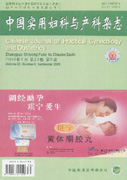Pregnancy of women with cardial prosthetic valve replacement belongs to high-risk pregnancy.To ensure the safety of both mother and fetus,assessment of heart disease before pregnancy and multidisciplinary management during pregnancy should be done.At the same time,we should select appropriate anticoagulation therapy,monitor the condition closely and maintain the stability of coagulation state,and adjust the coagulation function in advance according to the comprehensive analysis of patients’ medical history,valvular status,anticoagulant dose and gestational weeks.

